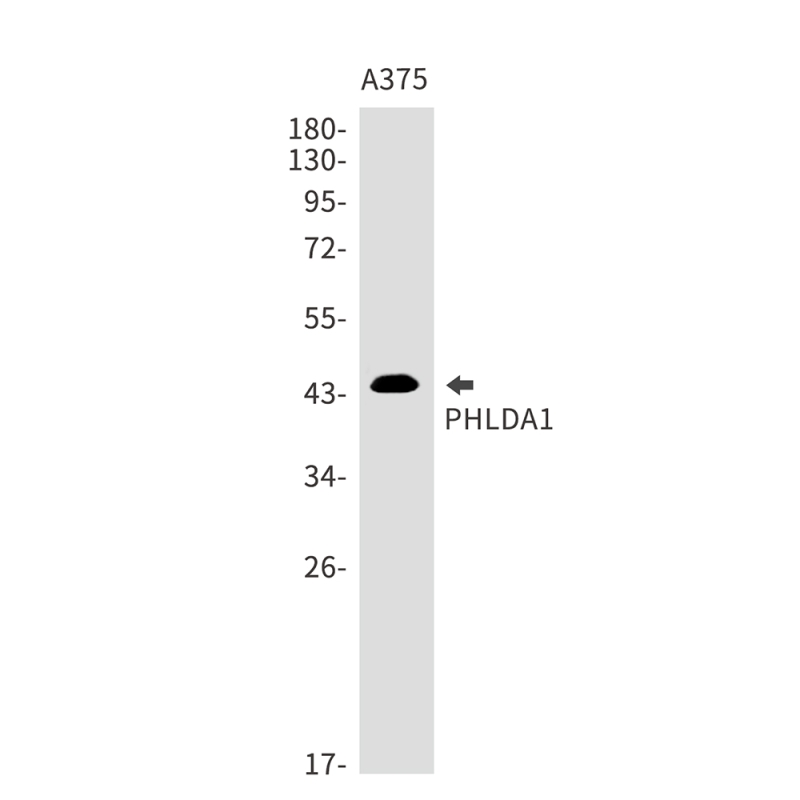
| WB | 1/500-1/1000 | Human,Mouse,Rat |
| IF | 咨询技术 | Human,Mouse,Rat |
| IHC | 1/50-1/100 | Human,Mouse,Rat |
| ICC | 1/50-1/200 | Human,Mouse,Rat |
| FCM | 咨询技术 | Human,Mouse,Rat |
| Elisa | 咨询技术 | Human,Mouse,Rat |
| Aliases | PQ-rich protein; PQR protein; Proline- and histidine-rich protein; T-cell death-associated gene 51 protein |
| Entrez GeneID | 22822 |
| WB Predicted band size | Calculated MW: 45 kDa; Observed MW: 45 kDa |
| Host/Isotype | Rabbit IgG |
| Antibody Type | Primary antibody |
| Storage | Store at 4°C short term. Aliquot and store at -20°C long term. Avoid freeze/thaw cycles. |
| Species Reactivity | Human |
| Immunogen | A synthetic peptide of human PHLDA1 |
| Formulation | Purified antibody in TBS with 0.05% sodium azide,0.05%BSA and 50% glycerol. |
+ +
以下是关于PHLDA1抗体的3篇参考文献,简要概括其研究内容:
1. **文献名称**:*"PHLDA1 is a direct p53-regulated inhibitor of autophagy in apoptosis"*
**作者**:T. Kawase et al.
**摘要**:研究发现PHLDA1作为p53的靶基因,通过抑制自噬相关蛋白(如Beclin-1)促进凋亡,其抗体在实验中用于验证PHLDA1与自噬通路的相互作用。
2. **文献名称**:*"PHLDA1 modulates macrophage polarization and suppresses tumor growth via Akt signaling"*
**作者**:Y. Wang et al.
**摘要**:利用PHLDA1抗体检测巨噬细胞中蛋白表达,发现其通过抑制Akt磷酸化调控M1/M2极化,从而影响肿瘤微环境及癌症进展。
3. **文献名称**:*"Upregulation of PHLDA1 in renal fibrosis: a biomarker study using immunohistochemistry"*
**作者**:X. Li et al.
**摘要**:通过PHLDA1抗体的免疫组化分析,揭示其在肾纤维化组织中显著高表达,提示其可能通过促进纤维化相关通路(如TGF-β)驱动疾病进程。
---
以上文献均以PHLDA1抗体为工具,聚焦于该蛋白在凋亡、免疫调控及纤维化中的功能机制。如需更多信息,可进一步检索PubMed或Google Scholar。
**Background of PHLDA1 Antibody**
PHLDA1 (Pleckstrin Homology-Like Domain Family A Member 1), also known as TDAG51. is a gene encoding a protein involved in apoptosis, cell proliferation, and differentiation. It contains an N-terminal pleckstrin homology (PH)-like domain and a C-terminal proline-rich region, enabling interactions with lipids or proteins to regulate signaling pathways, such as PI3K/Akt. PHLDA1 is implicated in diverse biological processes, including immune responses, stress signaling, and tumorigenesis, where it may act as either an oncogene or tumor suppressor depending on cellular context.
PHLDA1 antibodies are essential tools for studying its expression, localization, and function in research. They are widely used in techniques like Western blotting, immunohistochemistry (IHC), and immunofluorescence (IF) to detect PHLDA1 in tissues or cell lines. These antibodies help elucidate its role in diseases, particularly cancer (e.g., breast, liver, colorectal), where dysregulated PHLDA1 expression correlates with prognosis and therapeutic resistance. Additionally, PHLDA1 is studied in metabolic disorders and inflammatory conditions.
Validated PHLDA1 antibodies exhibit high specificity, often confirmed by knockout controls, and cross-react with orthologs (e.g., human, mouse, rat). Researchers rely on these reagents to explore PHLDA1’s dual roles in pro-survival or pro-apoptotic pathways, making it a potential biomarker or therapeutic target. Commercial antibodies are typically developed using immunogens derived from conserved regions of the protein to ensure broad applicability.
×